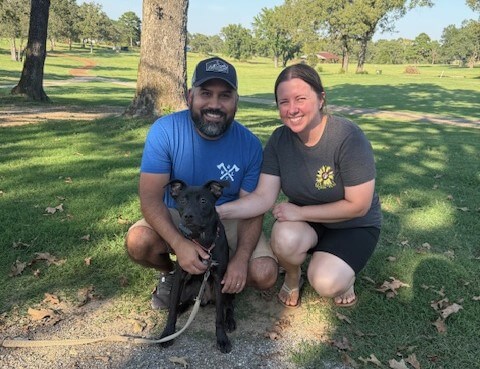Can Old Dogs Learn New Tricks?

Have you ever wondered if the saying "you can't teach an old dog new tricks" holds any truth? Many dog owners believe that once a dog reaches a certain age, their ability to learn diminishes. However, the truth is far more encouraging.
While it's natural to think that younger dogs are more receptive to dog obedience in Dallas, older dogs are equally capable of learning new behaviors and tricks.
Today, let's debunk the myth and explore why age should never be a barrier when it comes to teaching your faithful companion something new and exciting.

Do Old Dogs Have the Ability to Learn?
Contrary to popular belief, older dogs have remarkable cognitive abilities that allow them to learn new tricks and behaviors. It's true that aging can bring about changes in behavior and cognition, but research has shown that older dogs retain the ability to learn and adapt.
For example, a study involving over 250 dogs in Austria and Hungary found that even the oldest pets in the group could learn to use a touchscreen with their snouts when shown specific stimuli.
Factors Influencing Learning in Older Dogs
Physical Health and Mobility
Dogs with arthritis or other mobility issues may find certain movements challenging, affecting their participation in training sessions. Trainers must consider these limitations and adjust their techniques to make sure exercises are comfortable and safe for your senior dog.
Previous Training and Experience
A dog's previous training and life experiences can influence how readily they pick up new behaviors in their senior years. Dogs with a history of obedience or hunt training may respond more quickly to new commands, while those with limited exposure to training may require more patience and repetition.
Can Old Dogs Get Obedience Training?
Age should never be a barrier to obedience training. In fact, training can be incredibly beneficial for older dogs. Obedience training helps maintain mental sharpness, strengthens the bond between dog and owner, and enhances your pet’s quality of life.
Older dogs can learn basic commands like sit, stay, and come, as well as more advanced behaviors with patience and safe e-collar training from professionals.
However, we do recommend starting obedience training as early as possible. Since puppies have a natural curiosity and eagerness to learn, they are more receptive to new experiences and training. Their young age also allows them to adapt quickly to new behaviors and establish good habits early on.
Tips for Training Older Dogs
Start with Professional Guidance
Professional dog trainers understand the unique challenges of senior dogs and can tailor their training methods to suit their physical abilities and cognitive strengths. Try seeking professional guidance first to ensure the training sessions are structured, effective, and enjoyable for both you and your dog.
Adjust Expectations
Be patient and understanding of any physical limitations your dog may have.
Keep Sessions Short and Fun
Older dogs may tire more quickly, so keep training sessions brief and enjoyable.
Monitor Health Regularly
Older dogs can have health issues that may affect their training. Regular veterinary check-ups will help ensure your dog is physically capable of participating in training activities and can help identify any issues that need to be addressed.

Ready to Help Your Dog Discover Their Potential with Dog Obedience in Dallas?
Contact One Shot Retrievers today for expert dog obedience training, gun dog training, boarding, and more. And don't miss out on our upcoming snake avoidance training session on August 31st, where your dog can learn valuable safety skills.

When Should Obedience Training Start? How Early Development Shapes Your Dog’s Behavior
Learn how early training shapes obedience. Contact One Shot Retrievers for trusted dog training in Tyler, Texas, and start today.
Read more
Should Every Dog Know How to Heel?
Learn why heel matters, how it reduces pulling, and how Jacksonville, TX, dog training experts teach clear, reliable walking behavior.
Read more




